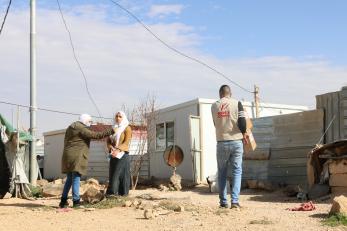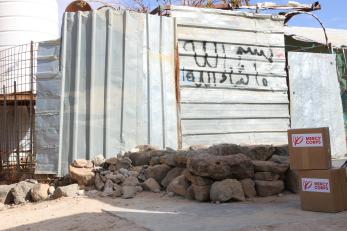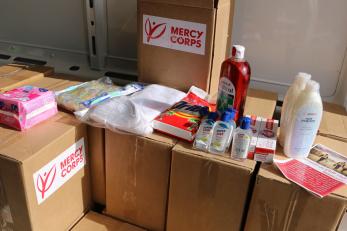Mercy Corps working toward preventing the spread of COVID-19 in Zaatari refugee camp

Since mid-March, the Jordanian government has been taking preventive measures to control the spread of COVID‑19. These measures include lockdowns, curfews and restrictions on citizen movement.
In June, the government started gradually easing the lockdown measures after which the number of positive cases rose across the kingdom.
On September 10, the Jordanian Ministry of Health confirmed the first three COVID‑19 cases in Zaatari Syrian refugees’ camp, two of the cases were of Jordanians (service providers) and the third was a Syrian woman refugee.
COVID‑19 cases in Zaatari camp have been increasing gradually. As of today, a total of 754 refugees tested positive, of which 490 have recovered according to a recent UNHCR report.
With funding from the Covid Resilience Fund, Mercy Corps has been able to deliver 2,000 hygiene kits to Zaatari refugee camp. In collaboration with UNICEF, UNHCR and NRC we started distribution of the kits to families in at-home quarantine. Whenever there is a positive case in the camp, a section of the camp is closed off and put in home quarantine. Kits are distributed to families who need them most.

The kit distribution is conducted through door-to-door delivery. Each kit includes hygiene products such as toothpaste, toothbrush, sanitizer, shampoo, nail clipper, soap bar, face towel, sanitary napkins, surface disinfectant, and laundry powder. Mercy Corps will support more than 2,000 families in the camp.

The hygiene kit distribution is part of the ISHRAK program. This activity is funded by COVID‑19 Resilience Fund and allocated to Jordan by HQ, with funding from SHELL.
ISHRAK’s COVID‑19 response aims to reach more than 5,000 vulnerable children and families in Syrian refugee camps in Jordan to mitigate the impact of the spread of COVID‑19 among the refugees through hygiene kit distribution along with Remote Psychosocial Support (RPSS), psychosocial sessions and parenting skill sessions.